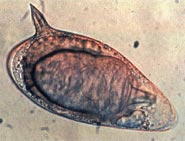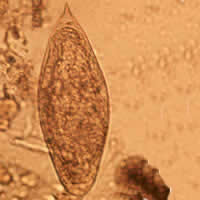Related Research Articles

Schistosoma is a genus of trematodes, commonly known as blood flukes. They are parasitic flatworms responsible for a highly significant group of infections in humans termed schistosomiasis, which is considered by the World Health Organization as the second-most socioeconomically devastating parasitic disease, with hundreds of millions infected worldwide.

Schistosomatidae is a family of digenetic trematodes with complex parasitic life cycles. Immature developmental stages of schistosomes are found in molluscs and adults occur in vertebrates. The best studied group, the blood flukes of the genus Schistosoma, infect and cause disease in humans. Other genera which are infective to non-human vertebrates can cause mild rashes in humans.
Schistosoma japonicum is an important parasite and one of the major infectious agents of schistosomiasis. This parasite has a very wide host range, infecting at least 31 species of wild mammals, including nine carnivores, 16 rodents, one primate (human), two insectivores and three artiodactyls and therefore it can be considered a true zoonosis. Travelers should be well-aware of where this parasite might be a problem and how to prevent the infection. S. japonicum occurs in the Far East, such as China, the Philippines, Indonesia and Southeast Asia.

Schistosoma mansoni is a water-borne parasite of humans, and belongs to the group of blood flukes (Schistosoma). The adult lives in the blood vessels near the human intestine. It causes intestinal schistosomiasis. Clinical symptoms are caused by the eggs. As the leading cause of schistosomiasis in the world, it is the most prevalent parasite in humans. It is classified as a neglected tropical disease. As of 2021, the World Health Organization reports that 251.4 million people have schistosomiasis and most of it is due to S. mansoni. It is found in Africa, the Middle East, the Caribbean, Brazil, Venezuela and Suriname.

Oncomelania hupensis is a species of very small tropical freshwater snail, an aquatic gastropod mollusk in the family Pomatiopsidae.

Biomphalaria is a genus of air-breathing freshwater snails, aquatic pulmonates belonging to the family Planorbidae, the ram's horn snails and their allies.

Schistosoma intercalatum is a parasitic worm found in parts of western and central Africa. There are two strains: the Lower Guinea strain and the Zaire strain. S. intercalatum is one of the major agents of the rectal form of schistosomiasis, also called bilharzia. It is a trematode, and being part of the genus Schistosoma, it is commonly referred to as a blood-fluke since the adult resides in blood vessels.

The ricefield rat is a species of rat found throughout Southeast Asia.

The greater bandicoot rat or Indian bandicoot rat is a species of rodent in the family Muridae found in Bangladesh, China, India, Indonesia, Laos, Malaysia, Myanmar, Nepal, Sri Lanka, Taiwan, Thailand, and Vietnam[Pakistan]. It can grow to about 27–29 cm without including the tail which can grow to 28 cm. These should not be confused with marsupial bandicoots which inhabit Australia and neighbouring New Guinea, which were named after the bandicota rats.
Tricula is a genus of freshwater snails with a gill and an operculum, aquatic gastropod mollusks in the family Pomatiopsidae.
Schistosoma indicum is a species of digenetic trematode in the family Schistosomatidae. The parasite is widespread in domestic animals in India and other Asian countries.

Pomatiopsidae is a family of small, mainly freshwater snails, that have gills and an operculum, aquatic gastropod mollusks in the superfamily Truncatelloidea.
Schistosoma ovuncatum is a schistosome parasite, first described in 2002. Its recognition as a new species only occurred when zoologists were re examining specimens originally described in 1984

Neotricula aperta is a species of freshwater snail, an aquatic gastropod mollusk in the family Pomatiopsidae.
Schistosoma mekongi is a species of trematodes, also known as flukes. It is one of the five major schistosomes that account for all human infections, the other four being S. haematobium, S. mansoni, S. japonicum, and S. intercalatum. This trematode causes schistosomiasis in humans.

Indoplanorbis is a genus of air-breathing freshwater snail. Its only member species is Indoplanorbis exustus, an aquatic pulmonate gastropod mollusk in the family Planorbidae, the ram's horn snails. The species is widely distributed across the tropics. It serves as an important intermediate host for several trematode parasites. The invasive nature and ecological tolerance of Indoplanorbis exustus add to its importance in veterinary and medical science.

Schistosoma spindale is a species of digenetic trematode in the family Schistosomatidae. It causes intestinal schistosomiasis in the ruminants.

Neotricula is a genus freshwater snails which have a gill and an operculum, gastropod mollusks or micromollusks in the family Pomatiopsidae.
Schistosoma bovis is a two-host blood fluke, that causes intestinal schistosomiasis in ruminants in North Africa, Mediterranean Europe and the Middle East. S. bovis is mostly transmitted by Bulinus freshwater snail species. It is one of nine haematobium group species and exists in the same geographical areas as Schistosoma haematobium, with which it can hybridise. S. bovis-haematobium hybrids can infect humans, and have been reported in Senegal since 2009, and a 2013 outbreak in Corsica.
References
- ↑ Attwood, S. W.; Panasoponkul, C.; Upatham, E. S.; Meng, X. H.; Southgate, V. R. (2002). "Schistosoma ovuncatum n. sp. (Digenea: Schistosomatidae) from northwest Thailand and the historical biogeography of Southeast Asian Schistosoma Weinland, 1858". Systematic Parasitology. 51 (1): 1–19. doi:10.1023/A:1012988516995. PMID 11721191. S2CID 21696073.